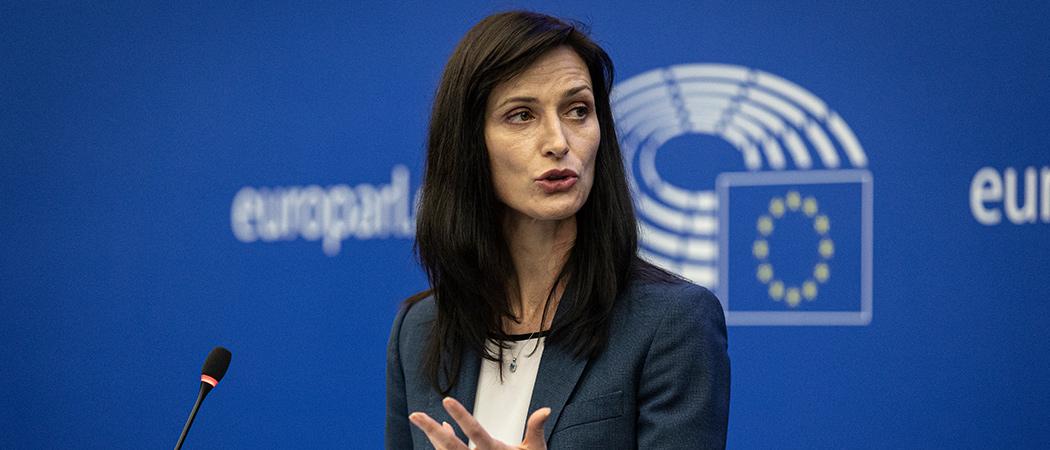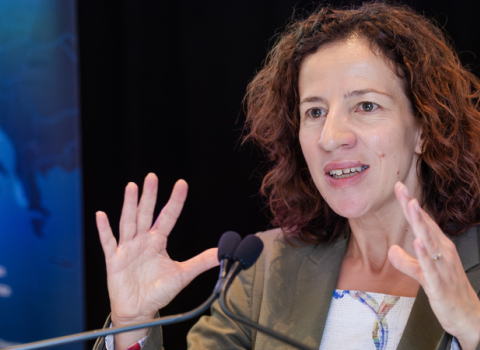Among its proposals is an EU system for awarding joint degrees. But stakeholders doubt member states will give up national competences in higher education in order to deliver this

Mariya Gabriel, Research Commissioner. Photo: European Union
The European Commission has put a plan for a European degree at the centre of a new strategy to boost transnational cooperation in Europe’s higher education system, but universities say the proposal is overly ambitious, and question if member states will give up their national competence to let Brussels decide how universities award diplomas.
The university strategy, announced by Commission vice-president Maragaritis Schinas and research commissioner Mariya Gabriel on Tuesday, calls for the EU work towards establishing a joint European degree, a move that would reduce the administrative burden of setting up cross-border joint programmes and allow students to get international experience more easily.
This would be underpinned by a new digital ID for students, based on the existing European student card initiative, enabling them to move from country to country.
The strategy also includes a proposal to expand the pilot programme for European Universities, from the current 41 alliances, to 60 alliances involving more than 500 universities by mid-2024. To support this, the Commission plans to launch an Erasmus+ pilot programme this year which would enable universities to test the practicalities of having a legal statute to allow them to more easily pool resources.
These ideas are not new, but it is the first time the Commission has put them into a single document, which is now meant to serve as a starting point for negotiation with member states.
After French president Emmanuel Macron floated the idea of a European university in a speech at the Sorbonne in November 2017, the Commission launched the pilot programme allowing universities to form cross-border alliances. The 41 alliances that have been set up lack a proper legal framework to would allow them to tighten cooperation.
Anna-Lena Claeys-Kulik, policy coordinator at the European University Association (EUA) told Science|Business the Commission’s strategy document does provide a few more details on how it plans to cement the university alliances and support them in issuing joint European degrees.
“But many questions are still open,” said Claeys-Kulik. “The key question is what are the challenges of transnational university collaboration and how a joint degree or a legal status [for alliances] would help.”
The problem with joint degrees
Aspects of these initiatives are included in the long running Bologna process, set up in 1999 to ensure comparability in the standards and quality of higher education qualifications across Europe. Although rules have been agreed under Bologna for quality assurance of joint programmes, several EU member states participating in the process have yet to implement them.
Maria Kelo, director for institutional development at the EUA said the idea of a European degree is “ambitious and perhaps overly optimistic” because education is a national competence over which the Commission has no jurisdiction. Member states measure the number of credits needed for particular diplomas differently. To complicate the matter further, countries with federal systems, such as Germany and Belgium, have additional layers of jurisdiction when it comes to higher education policy.
The Commission has been testing the idea of joint EU degrees with the Erasmus Mundus programme, which provides funding for students to do cross-border master’s degrees in a certain number of subjects. But, according to Kelo, the scheme is hampered by the fact that member states have different legal requirements for offering joint degrees, while in other countries universities were not even allowed to do so.
The Commission suggests the EU should also have a common system for quality assurance and recognition of diplomas. As Kelo noted, member states adopted a common quality assurance process within the Bologna framework, which gave national accreditation institutions a methodology for establishing joint education programmes. Of 49 countries in the Bologna process, only 17 have fully implemented it.
Given this failure to implement existing, agreed, processes, university representatives are wondering how the Commission can hope to establish a new system for setting up joint degrees. It’s not that there is anything wrong with the tools provided through the Bologna process, Kelo said. “The problem is that [they are] not [implemented],” she said. “We will not solve that by changing their name.”
More questions than answers
The strategy begs a lot of questions, starting with: which institution would award the European degree? If the EU was to create a separate institution to do that, how would member states react? And why would member states agree to recognise an EU diploma if they don’t accept a degree from a neighbouring country?
At the moment, some member states require an application for equivalency. If, for example, a student with a Hungarian master’s diploma wants to apply for PhD in Romania, he or she would have to translate and submit paperwork that proves the Hungarian master’s degree fulfills the credits required for a Romanian PhD programme.
In a press conference on Tuesday, Gabriel acknowledged the EU is “quite far” from having a common EU university diploma. “What we are suggesting is to have something that will move forwards step by step, with the help of all member states, and at the end we will have a European diploma that will be recognised by the national authorities.”
The long and winding road
Whatever plans the Commission may have, they need to be approved first by the member states before they can edge towards reality.
The Commission hopes member states will give the first green light to its plan in a ministerial meeting in April organised by the French presidency of the EU Council. Member states may agree this proposal can be developed, but they are unlikely to be willing to give up powers in these areas. “Even if they are, that will not happen in two months,” said Kelo.
Kurt Deketelaere, secretary general of the League of European Research Universities (LERU) told Science|Business that universities welcome the idea of eliminating national and EU barriers in the governance of international collaborations, but this would require a significant legislative proposal by the Commission.
“Of course, member states are against that and, as a consequence, the [Commission] backs off,” said Deketelaere. “The consequence of that is a nice text with [words like] support, encourage, promote, which is absolutely no guarantee that things will change in the short, mid- or long term.”
Implementing the proposals put forward on the European degree and alliances of European universities by 2024 would require additional financial support, which Commission has not budgeted for. The timeline is too short for the amount of work ahead, said Deketelaere. “But okay, it certainly sounds good,” he added.
Paula Eerola, vice rector for postgraduate research education at the University of Helisnki, said a reform of European university cooperation is certainly needed, but the implementation will be “a long and winding road” because it involves coordinating 27 different education systems which are under the jurisdiction of national governments.
Gabriel admitted the proposal is “an appeal” to member states and the Commission is “fully aware” of its limited jurisdiction.
Deketelaere said progress depends on if member states welcome the proposal and choose to implement it. “The proof of the pudding is in the eating,” he said.





 A unique international forum for public research organisations and companies to connect their external engagement with strategic interests around their R&D system.
A unique international forum for public research organisations and companies to connect their external engagement with strategic interests around their R&D system.